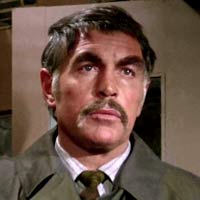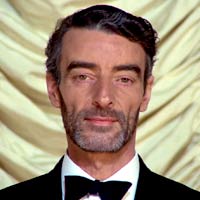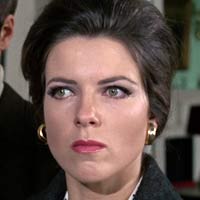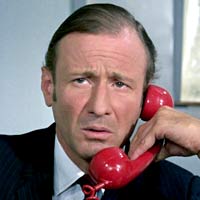|
|
|


|
 |
|
Image © ITV Studios, 1969 |
| |
Larry Taylor
Character & Episode:
Man in Phone Booth in A Sentimental Journey
Born: 13/07/1918, Peterborough, Cambridgeshire,
England (as Laurence Taylor)
Died: 06/08/2003, Johannesburg, South Africa
Larry Taylor was a busy stuntman and character actor,
instantly recognisable due to his swarthy, gap-toothed
appearance. He often played heavies, but was also cast in a
variety of foreign roles. As an actor, Larry featured in
significantly more than a hundred
television and film productions during his career. He spent many
years in the army, serving in India and Palestine before the
Second World War. After demobilisation, he secured a job in the
film industry as a stuntman - in addition to performing stunts,
he also taught other performers how to do their own - and early
work in this field included Stewart Granger's famous fight in
the film Waterloo Road (1945). He toured in variety in
second half of 1940s, and appeared in legitimate theatre from
the early 1950s. His screen debut as an actor came in 1946 in an
uncredited role as a sergeant in the film Captive
Heart. Regular screen work
did not materialise until 1952 when he began to gain bit-part
roles mainly in film which included Lady in the Fog
(1952), Sea Devils (1953) and Breakaway (1956). In
1956 Larry played Perdicus in the historical film
Alexander The Great which starred Richard Burton and
Frederic March. By the late Fifties, he began to break into
television, appearing in programmes that included Sword of
Freedom (1957) and Sheep's Clothing (1957).
Meanwhile, he continued to gain film roles in productions such
as Robbery Under Arms (1957), The Gun Runners
(1958) and First Man Into Space (1959).
Larry's
television work during the Sixties included contributions
to programmes such as Sir Francis Drake (1961), Danger
Man (1965), The Prisoner
(1967), Man in a Suitcase (1968), The Avengers (1968) and Department S
(1969). He could also be spotted regularly between 1963 until
1969 in the The Saint, a popular television series in
which he appeared on many occasions. Sixties film work included the
historical war drama Zulu (1964), two Carry On
appearances (in Carry On Follow That Camel (1967) and
Carry On Up the Khyber (1968)) and the Morecambe and Wise comedy The
Magnificent Two (1967). In the early 1970s he featured in the films
The Wife Swappers and The Last Valley. He continued
to appear in television series, which included UFO (Mindbender, 1971),
Jason King (As Easy as ABC, 1971)
and The Adventurer (Love Always, Magda, 1972).
In 1974, Larry and his wife, Ann, a leading
film makeup artist, moved to South Africa where he continued his
career. Among other engagements, he played Captain Birdseye in a
series of South African commercials for Bird's Eye Fish Fingers
(the British version was played by John Hewer from 1967 to
1998). He made his final credited screen appearance in 1995,
playing Sheriff Hughes in the horror film The Mangler.
In their personal life, Larry and Ann had
son, Laurie (1945-), who, as Rocky Taylor, became a well-known
stuntman. Rocky was regularly employed on Randall and Hopkirk
(Deceased). Larry Taylor died of a heart attack in South Africa at the age
of eighty-four in 2003.
|
|
 |
|
Image © ITV Studios, 1969 |
| |
Tony Thawnton
Character & Episode:
Fernandez in That's How Murder Snowballs
Born: 1920, London, England (birth surname: Wagstaff)
Like several actors who appeared
in That's How Murder Snowballs, Tony Thawnton was generally a
minor supporting actor. His parents had a clerical job planned
for him but he ran away from home at 16 seeking a career on the
stage. He would later credit the greatest thrill of his career
as having come when he was stage director in a theatre
production of Peter Pan, the cast of which included Lady
Forbes Robertson and Sir Seymour Hicks. In 1940 he was called up
by the Armed Forces and served with the Royal Armoured Corps. He
gained the rank of Captain in the 3rd King's Own Hussars. From
the mid-1940s he resumed his career in theatre. In 1946, he
decided to officially change his real surname Wagstaff to
Thawnton, which he used as his stage name. He made his screen debut in
the first half of the 1950s and during this decade he played
regular parts in The
Buccaneers, which featured a young Robert Shaw in the lead
role, and The
Adventures of Robin Hood, which starred Richard Greene.
Tony remained busy until the first half of
the 1970s on many film and television projects, but again his
roles were not significant. He did appear in several well-known
shows in the Sixties and early Seventies and these included
The Plane Makers (1963), Zero One (1965), Danger
Man (1965), The Avengers (1968), and The Baron
(1966), Department S (1969) and Jason King (1972)
for ITC. He also made a notable supporting appearance in the
feature film The Wrong Box (1966), which starred Michael
Caine, Tony Hancock, Peter Cook and Dudley Moore. His last
credited screen appearance was in the
detective series Special Branch in 1973.
In his personal life, Tony was initially
married to actress Gabrielle Blunt (1919-2014). The marriage
produced two children, Paul (born in 1946) and Nickolas (born in
1947) but ended in divorce in 1950. His second marriage was to a
dancer, Lisa Veronova. They had daughter, Corinna (born in
1952). This marriage also ended in divorce. Tony's third wife
was Joy Gale.
|
|
 |
|
Image © ITV Studios, 1969 |
| |
Hilary Tindall
Character & Episode:
Cynthia Seaton in The Smile Behind the Veil
Born: 14/08/1938, Manchester, Lancashire, England
Died: 05/12/1992, Selbourne, Hampshire, England
Hilary Tindall was born and bred in Manchester. Growing up,
she seriously considered becoming a dress designer
but ultimately chose a career path in acting. She trained at
RADA, graduating in 1958, and started in the
business working on a single production at the
Richmond Theatre. After this, she went to the
Marlowe Theatre, Canterbury, and worked there for
one year appearing in juvenile lead roles on stage
and working also as an assistant stage manager for
the company. Her big break came in
William Douglas Home's comedy Aunt Edwina,
which ran at The Fortune Theatre in London's West End. Soon afterwards, she worked at the Old Vic, and despite her
eventual success on television, would later express
a preference for the stage. She appeared for
ITC in The Baron, The Champions and of
course, Randall and Hopkirk (Deceased) and
went on to even greater mainstream success by
starring in The Brothers, the highly popular
BBC television drama series centred around a road
haulage firm. Appearing as one of the major
characters, Anne Hammond, Hilary stayed with
the series for the first four runs and returned for
three further episodes in the seventh series
(coincidentally, Mike Pratt featured in ten episodes
of Series 6). Her role in The Brothers brought her
to international recognition, notably in Sweden,
where the series was remade as The Ship Owner.
She was offered a major part in this remake but
turned the opportunity down.
Hilary
also appeared in the high-rating ATV hospital soap
opera Emergency Ward 10, The Fall and Rise
of Reginald Perrin, Tales of the Unexpected
and the Channel 4 pilot episode Max Headroom: 20
Minutes into the Future.
Hilary Tindall was
regarded a fine actress with consummate camera
technique. She had both vivacity, charm and a warm
laugh, and liked to do impersonations at script
readings, which had everyone laughing and endeared
her to her colleagues. Her career was tragically cut
short by bowel cancer, a disease she fought for six
years before succumbing to it at just 54 in 1992.
She was married to theatrical and literary agent Robin Lowe
(1925-2002), with
whom she had two children, Hilary and Julian. Robin
was the son of John Loder (1898-1988), a British
film star of the late silent and early sound era who
enjoyed great success in German, British and
American screen productions.
|
|
John A. Tinn
Character & Episode:
Sung Lee Crackan in It's Supposed To Be Thicker Than Water
Born: 10/06/1913, Bhamo, Burma (as John Ali Tinn)
Died: 1978, London, England
John A. Tinn was a minor supporting actor
with little more than thirty film and television credits in
Britain. Educated at the American Baptist Mission School in
Upper Burma, John gained his first theatrical experience at
Mandalay in 1933. Later, he worked in British Burma Films and
for National Films Studios at Rangoon. In 1939, three weeks
after the Second World War broke out, he joined the Merchant
Navy, eventually bringing him to England, where at one time he
worked as an engineer. His first stage work in the United
Kingdom was with a touring American show called Double Event
in 1945-46. Subsequently, John settled down in London and worked
in films in small, uncredited roles. His film works during the
1950s included appearances in Captain Horatio Hornblower R.N.
(1951), The Planter's Wife (1952) and The Purple Plain
(1955). On television of that era, John appeared in such series
as The Vise, Lilli Palmer Theatre and McCreary
Moves In. The latter of these series featured John in a
regular role as a policeman. During the 1960s, his screen
appearances on the screen were noticeably less frequent, but a
decade later he again began to concentrate in this area, mainly
on television. His last appearance was in 1979 in the BBC series
The Other Side.
Beside his activity in acting, John was
also a multi-instrumentalist and played Malayan background music
for the whole BBC TV series More Than Robbery in 1958 (he
also had role in one episode of series) and the ITV series
Time Out for Peggy (1958-59). He also was able to speak six
languages.
In his personal life, John was married to
Kathleen Forster. He lived into his mid-60s and died in London
in 1978.
|
|
 |
|
Image © ITV Studios, 1969 |
| |
Frederick Treves BEM
Character & Episode:
Inspector in The Trouble With Women
Born: 29/03/1925, Cliftonville, Kent, England (as
Frederick William Treves)
Died: 30/01/2012, Mitcham, London, England
Frederick Treves had a long
and distinguished career in the acting profession in which he
made more than two hundred television and film appearances.
Born the son of a Margate doctor, he was educated at Selwyn
House prep school in Broadstairs, Kent, and from there went to
Nautical College Pangbourne at 13 years of age. Before he embarked on his
acting career he served in the Merchant Navy from the age of 17 –
his first voyage was aboard the freighter Waimarama,
which had been converted for war use and he boarded at
Birkenheard. The ship was part of the 'Pedestal' convoy to Malta, and was sunk
on 13th August 1942 by German bombers. He saved a number of his
crewmates including the only ship officers to survive the
sinking. As a result, Frederick, still only 17, was awarded the
British Empire Medal and the Lloyd's War Medal for his actions.
After the war Frederick went
to RADA and, upon graduation in 1948, went into theatre. He made his
screen debut in 1953, in Wheel of Fate. In 1956 he
appeared in minor roles in ten episodes of the television series
The Adventures of Sir Lancelot. In 1960 he was the radio
announcer in Carry On Constable, his only contribution to
the famous film series. Most of his Sixties roles were for
television and included A for Andromeda (1961), An
Enemy of the State (1965), The Avengers (1967),
The Baron (1967) and Randall and Hopkirk (Deceased)
(1969). The Seventies continued in a similar vein, with
television guest appearances in The Liver Birds (1972),
The Protectors (1972) and the following year he played Colonel Cranleigh-Osborne,
a recurring character in the drama
series The Regiment alongside Christopher Cazenove and
Dennis Lill.
Frederick was also active on radio. His
long association with radio also extended into writing scripts,
one of which, Operation Pedestal for BBC Radio in 1974,
drew on his wartime experiences in the Merchant Navy.
By the mid-Seventies, Frederick's profile on
television had heightened with prominent roles in well-regarded
series including The Naked Civil Servant (1975) with John
Hurt, and The Sweeney (1976). In 1980 he featured as an
alderman in the film The Elephant Man which starred John
Hurt and Anthony Hopkins. Frederick's great uncle was Sir
Frederick Treves (1853-1923), the surgeon who became famous for discovering
John Merrick ('The Elephant Man') and was played in the film by
Anthony Hopkins. Appearances in the Eighties included a
Doctor Who serial, Meglos, in which he played the
colourful intergalactic kleptomaniac Brotadac, a role which saw
him cast very much against type, and The Jewel In The Crown
(1984), Inspector Morse (1987) and as Frank Harrington, a
regular character in
the drama series Game, Set and Match
(1988). During the Nineties, Frederick appeared in such
programmes as Lovejoy (1993), The Chief (1995) and
Kavanagh QC (1997). His last screen appearance was in
2003 in an episode of Rosemary & Thyme.
In his personal life, Frederick married
Jean Stott (1933-2018) in 1956 and they had two sons, Frederick
(born in 1957) and Patrick (born in 1958), and a daughter,
Jennet (born in 1962). Frederick and Jean's eldest son is also
an actor, who works under the stage name Simon Treves and most
famously played 'Stinker' Pinker in the ITV Jeeves and
Wooster adaptations which starred Hugh Laurie and Stephen
Fry.
|
Section compiled by Darren Senior
Additional research and presentation by Denis Kirsanov and Alan Hayes
|
|
|
Back to Top |
|